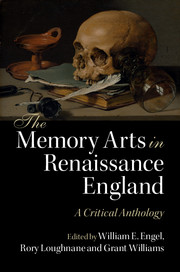Book contents
- Frontmatter
- Dedication
- Contents
- List of figures
- Acknowledgements
- A note on abbreviations
- Introduction
- PART I The art of memory
- PART II Rhetoric and poetics
- PART III Education and science
- Introduction to Part III
- III.1 Thomas Elyot, The Governor (1531)
- III.2 Roger Ascham, The Schoolmaster (1570)
- III.3 Levinus Lemnius, The Touchstone of Complexions (1576)
- III.4 William Kempe, The Education of Children (1588)
- III.5 John Brinsley, Ludus literarius (1612)
- III.6 Robert Burton, The Anatomy of Melancholy (1621)
- III.7 Thomas Sprat, The History of the Royal Society (1667)
- III.8 John Wilkins, An Essay towards a Real Character (1668)
- III.9 Obadiah Walker, Of Education (1673)
- III.10 Robert Hooke, ‘An Hypothetical Explication of Memory’ (1682)
- PART IV History and philosophy
- PART V Religion and devotion
- PART VI Literature
- Index
- References
III.7 - Thomas Sprat, The History of the Royal Society (1667)
from PART III - Education and science
Published online by Cambridge University Press: 05 August 2016
- Frontmatter
- Dedication
- Contents
- List of figures
- Acknowledgements
- A note on abbreviations
- Introduction
- PART I The art of memory
- PART II Rhetoric and poetics
- PART III Education and science
- Introduction to Part III
- III.1 Thomas Elyot, The Governor (1531)
- III.2 Roger Ascham, The Schoolmaster (1570)
- III.3 Levinus Lemnius, The Touchstone of Complexions (1576)
- III.4 William Kempe, The Education of Children (1588)
- III.5 John Brinsley, Ludus literarius (1612)
- III.6 Robert Burton, The Anatomy of Melancholy (1621)
- III.7 Thomas Sprat, The History of the Royal Society (1667)
- III.8 John Wilkins, An Essay towards a Real Character (1668)
- III.9 Obadiah Walker, Of Education (1673)
- III.10 Robert Hooke, ‘An Hypothetical Explication of Memory’ (1682)
- PART IV History and philosophy
- PART V Religion and devotion
- PART VI Literature
- Index
- References
Summary
About the author
Thomas Sprat (bap. 1635, d. 1713) wrote the first account of the Royal Society, an organisation that promoted the advancement of science in England. He was not, however, a natural philosopher, but a literary writer and preacher, who rose to the deanship of Westminster and later the bishopric of Rochester.
About the text
Out of a concern for negative publicity, the Royal Society commissioned Sprat to write its history under the supervision of John Wilkins – one of its founding members. The book then is less an actual history than an apologia for the society's activities and objectives. The society's fellows felt vulnerable to suspicion, given that pursuing new knowledge in the conservative period of the Restoration risked the stigma of liberal politics. Materialist-based philosophies, with which the fellows were stereotypically associated, also risked accusations of breeding wickedness and even atheism. Having no involvement in natural historical enterprises prior to the book or after its publication, Sprat no doubt viewed it as a literary opportunity; nonetheless, his stirring defence of the experimental method and the new sciences inspired by Francis Bacon elicited sharp reactions from proponents of the universities, where humanists encouraged virtues fixed in scholarly engagements with classical texts. In his appeal to ban figurative expressions from discourse, Sprat's work has been traditionally regarded as registering an epistemic shift in the history of rhetoric, when the mode of persuasion capitulates to the mode of exposition. The book is divided into three parts, the excerpt falling under the first part, where Sprat evaluates ancient and modern theories on natural philosophy. The excerpt belongs to section 22 entitled ‘A Defence of the Royal Society in Respect of the Ancients’.
The arts of memory
Sprat forcefully spells out a Baconian recalibration of the relationship between traditional and innovative knowledge. Because the memory arts depend upon a reverential, if not sacred, attitude to the past, establishing the present as the benchmark of knowledge displaces remembering's epistemological prominence. One can no longer assume that the truth reveals itself through the authority of classical writers recovered by humanism; one discovers knowledge of the world not through collecting, digesting and synthesising what others have said but through observing and testing nature's facts with one's own senses.
Textual notes
Tho. Sprat, The history of the Royal-Society of London for the improving of natural knowledge (London, 1667), F4r–F4v.
- Type
- Chapter
- Information
- The Memory Arts in Renaissance EnglandA Critical Anthology, pp. 168 - 171Publisher: Cambridge University PressPrint publication year: 2016



